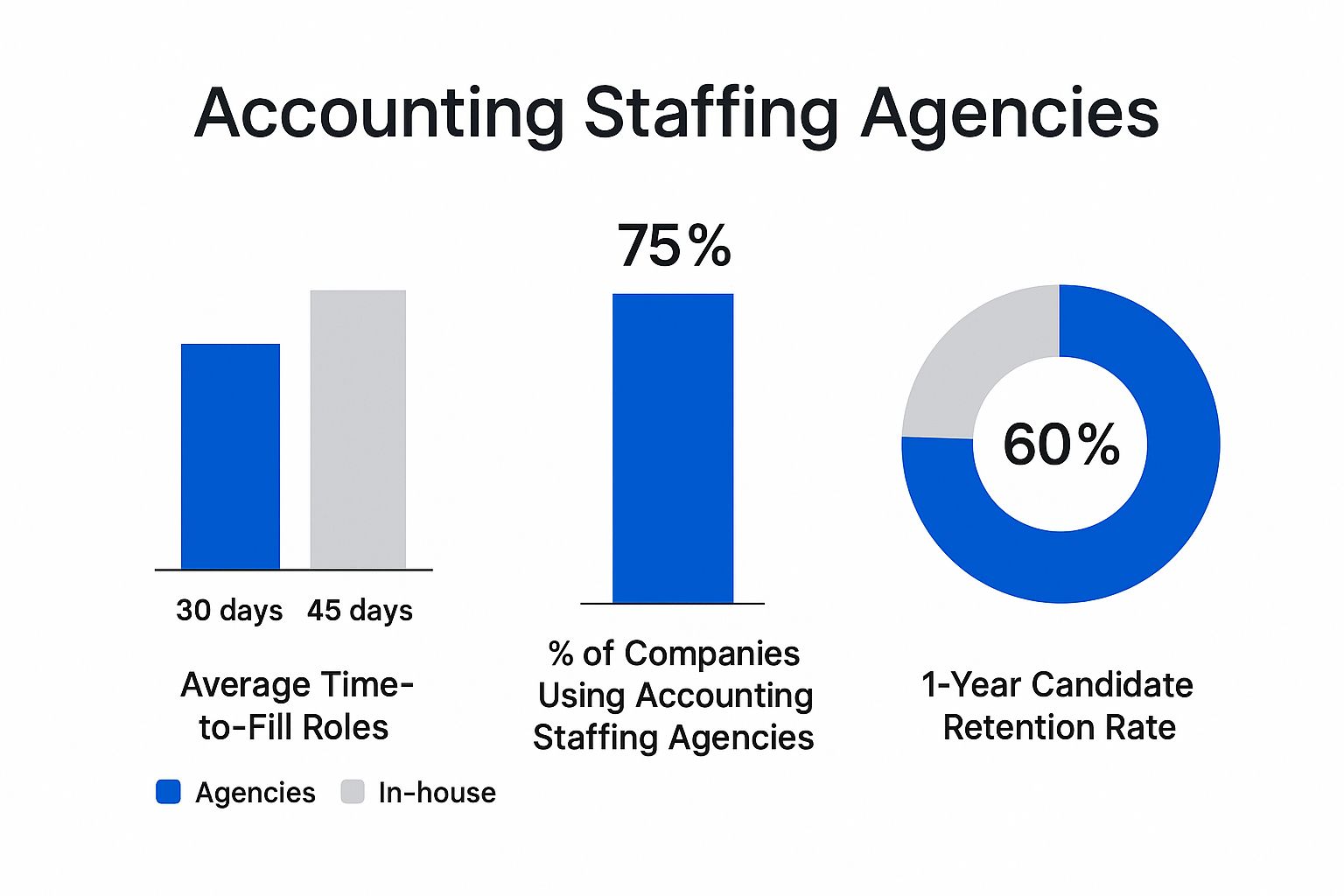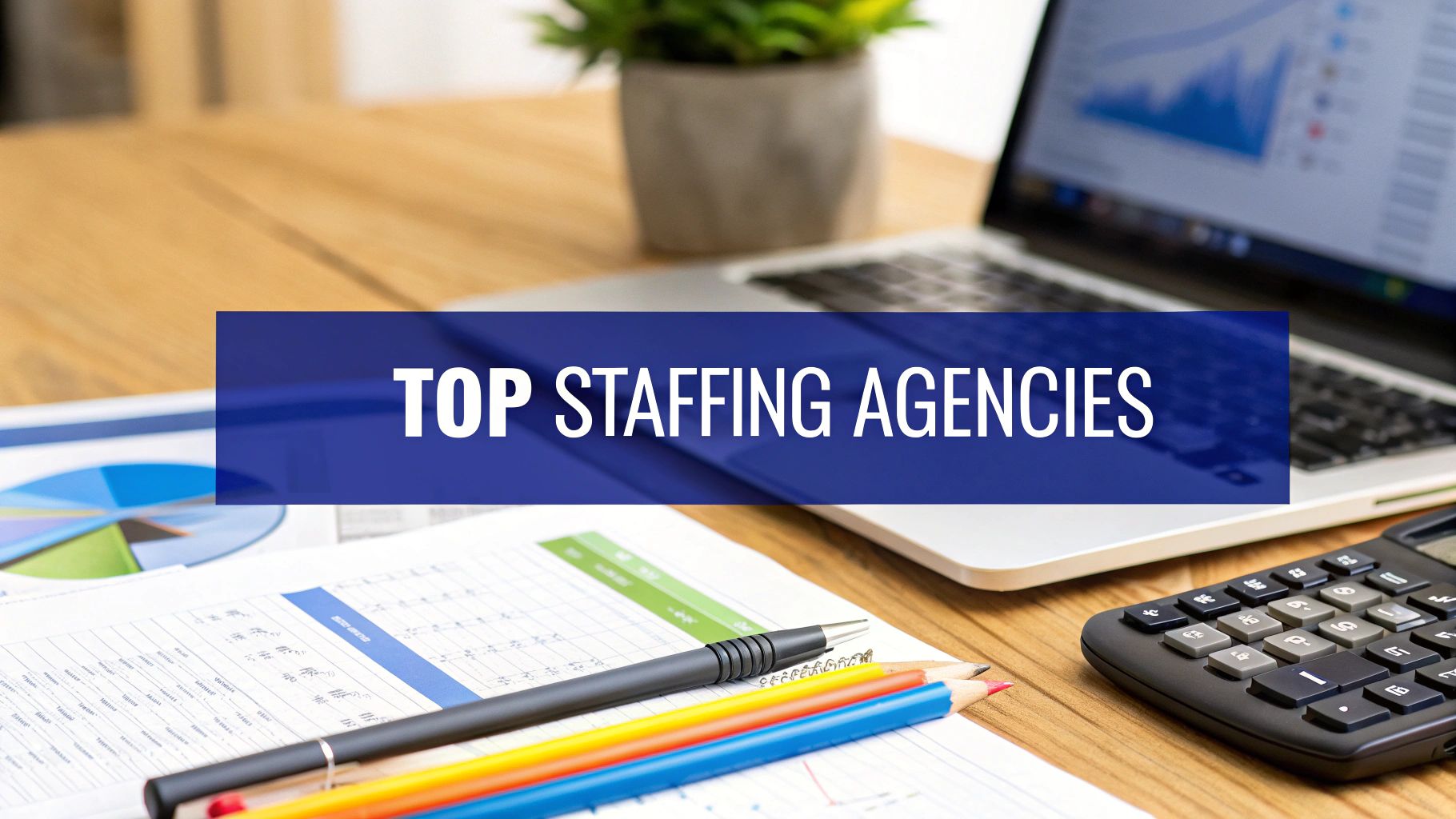In a fiercely competitive job market, an accounting staffing agency isn't just a helpful resource—it's your strategic advantage for landing top-tier financial talent. They bring deep industry knowledge and a ready-to-go pool of vetted candidates, which can dramatically slash your hiring timeline and, more importantly, improve the quality of who you hire.
Why a Specialist Agency Gives You the Upper Hand
Trying to navigate the UK’s financial recruitment scene on your own right now is incredibly tough. You're up against intense competition for skilled accountants, and with unemployment in key finance roles at historic lows, finding the right person can feel like searching for a needle in a haystack. This is precisely why partnering with a dedicated accounting staffing agency has shifted from being a luxury to an absolute necessity.
Let's look at the numbers, because they really paint a picture of the current market.
The Stark Reality of UK Accounting Recruitment
The demand for finance and accounting professionals is through the roof across the UK. This is made even more challenging by the exceptionally low unemployment rates within the profession. When you see how tight the talent pool is, you start to understand why standard job ads often fall flat.
UK Accounting & Finance Unemployment Rates
This table compares unemployment rates for key accounting roles against the UK national average, highlighting just how scarce top talent has become.
Source: ONS data analysis
With rates for roles like accountants and auditors sitting at a staggering 1.3%, it's clear your ideal candidate is almost certainly employed and not scrolling through job boards. They're what we call 'passive talent'. You can learn more about these in-demand finance roles and see how your needs stack up against the market.
A specialist agency lives and breathes this reality every single day. They spend their time building networks of these passive candidates—the skilled professionals who aren't looking for a job but are open to hearing about the right opportunity. This access to a 'hidden' talent pool is one of the biggest game-changers they offer.
Gaining an Edge Through Data-Driven Recruitment
It's not just about finding people; it's about finding the right people, efficiently. These agencies bring a level of focus that a generalist HR department often can't match. They understand the subtle differences between financial roles, from must-have software skills to specific regulatory knowledge, allowing them to vet candidates far more effectively.
This is where you see the real, tangible benefits of their expertise.

The data doesn’t lie. Agencies don't just fill roles faster; they find talent that sticks around, saving you from the costly and disruptive cycle of recruiting, hiring, and training all over again.
Speed, Specialism, and Strategic Insight
Working with an accounting staffing agency delivers a potent mix of benefits that directly address the biggest hiring headaches.
A Faster Hiring Process: An agency can often take the average time-to-hire from 45 days down to just 30. When a key member of your finance team leaves, that speed is invaluable.
True Niche Expertise: Do you need a forensic accountant? Or perhaps a tax specialist with deep knowledge of IFRS 17? A specialist firm knows exactly where to look and, crucially, how to properly assess their highly specific skills.
Less Risk for You: Most reputable agencies back their placements with a guarantee. If your new hire doesn't work out in the first few months, they'll find a replacement at no additional cost. It’s a safety net that protects your investment.
In a market this tight, speed and access are everything. An accounting staffing agency delivers both, connecting you with qualified professionals you simply wouldn't find on your own. It transforms hiring from a reactive headache into a proactive, strategic part of your business growth.
First, Nail Down Your Ideal Candidate Profile

Before you even pick up the phone to an accounting staffing agency, there’s some critical groundwork to do in-house. Trust me on this. If you go in with a vague idea of what you need, you’re just asking for a pile of irrelevant CVs and countless wasted hours.
The secret is to build a detailed candidate profile that serves as a blueprint for your perfect hire. This is about going much deeper than a standard job description.
Think of the difference between saying you need "a numbers person" versus "a management accountant with at least three years' experience in the SaaS sector, who is a Xero expert and understands IFRS 15 revenue recognition." One is a vague wish; the other is a laser-focused target. The more specific you are, the better an agency can zero in on genuine talent that fits.
Pinpointing Technical Skills and Software Proficiency
Let's start with the absolute must-haves. What specific technical skills does someone need to hit the ground running? Don't just list general duties—get granular about the exact competencies needed to perform them.
For instance, instead of just saying "handles bookkeeping," break it down:
- Must be proficient in Sage 50 for managing supplier invoices and bank reconciliations.
- Requires hands-on experience with UK GAAP and FRS 102 for preparing year-end financial statements.
- Needs demonstrable skill in advanced Excel functions like PivotTables and VLOOKUPs for financial modelling.
This level of detail is what makes the difference. If you're hiring for a credit control role, you’ll need to specify experience with debtor management processes. For an Accounts Payable Clerk, a rock-solid understanding of the purchase-to-pay cycle is key. For a bit more inspiration, our guide on crafting a detailed accounts payable job description offers a great template.
Articulating Soft Skills and Cultural Alignment
Technical skills might get a candidate an interview, but it’s the soft skills that determine whether they’ll actually succeed and stick around. A recent survey found that over 90% of employers believe soft skills are just as, if not more, important than technical abilities. Think honestly about your team's dynamics and your company's culture.
I’ve seen it happen time and again: a technically brilliant but abrasive accountant can poison an entire department. The cost to morale and productivity far outweighs their skills.
Consider what personal attributes are non-negotiable for your environment:
- A fast-growing tech start-up? You probably need an accountant who is adaptable, proactive, and comfortable with a bit of organised chaos.
- An established manufacturing firm? You might prioritise someone who is meticulous, process-driven, and a reliable team player.
- A role with client interaction? Excellent communication and relationship-building skills are paramount.
Setting a Realistic and Comprehensive Budget
Finally, your ideal candidate profile must be firmly planted in financial reality. Your budget is about more than just the annual salary. You need to be ready to discuss the total compensation package with any potential agency partner.
A complete budget should always include:
- Base Salary: Do your homework on current market rates for the role, experience level, and your location.
- Benefits Package: Factor in the cost of pensions, private health insurance, and any other perks you offer.
- Agency Fees: These are typically a percentage of the candidate's first-year salary, usually landing somewhere between 15% and 25%.
- Potential Bonus: If there are performance-based incentives, include them in your calculations.
Having this clear, all-inclusive budget from the start saves you from chasing candidates you can't afford and helps the agency focus its search on a realistic pool of talent.
How to Vet and Shortlist the Right Agencies

With a clear picture of who you need to hire, it's time to start the real work: finding and vetting potential accounting staffing agencies. This isn't a step to rush. The effort you put in now directly shapes the quality of candidates you’ll see later.
Your first move? Separate the specialists from the generalists. Look for firms that live and breathe finance and accounting. Their website, blog content, and case studies should be filled with insights about your industry, not just a vague list of sectors they cover. This initial research will help you build a solid longlist. From there, it's all about digging deeper to see who really has what it takes.
Gauge Their Real-World Industry Expertise
A true specialist does more than just claim "accounting" as a service area. Their team will often have consultants who focus on specific niches like audit, tax, or commercial finance. When you get them on the phone, don't be afraid to put their knowledge to the test.
Imagine you're a rapidly growing tech company that needs a new Financial Controller. You don't just need someone who can handle the numbers; you need a commercially sharp individual who gets the SaaS model.
When speaking to a potential agency, you should be asking pointed questions like:
- "Tell me about a similar Financial Controller role you've placed for another SaaS business."
- "Beyond qualifications, how do you probe a candidate's commercial instincts?"
- "Who on your team specifically handles recruitment for the tech sector?"
Their responses will tell you everything. You'll quickly see whether they genuinely operate in your world or are just trying to make a quick placement.
A great agency won’t just talk about the roles they fill; they’ll talk about the business problems they solve. They understand that hiring a Financial Controller is about gaining strategic insight, not just balancing the books.
Unpack Their Sourcing and Vetting Process
It's crucial to understand how an agency finds its people. Relying solely on job boards just won't cut it, especially when competition for top talent is fierce. The best candidates often aren't actively looking, so you need a partner with a proactive strategy for reaching them.
This is where knowing the key questions to ask recruiters becomes invaluable. Get straight to the point and ask about their methods. Do they have a deep, established network of passive candidates they can tap into? A top-tier finance recruitment agency will use multiple channels, not just one. You can dive deeper into what makes a great finance recruitment agency stand out in our guide.
Finally, you need to probe their screening process. How do they validate technical skills and qualifications? What's their method for assessing cultural fit? A thorough agency won't just forward you a pile of CVs. They'll conduct detailed, competency-based interviews and provide you with comprehensive notes on each shortlisted individual. This saves you from wasting time on candidates who only look good on paper.
Building a Productive Agency Partnership

Choosing an agency is the starting line, not the finish. I’ve seen many businesses make a great choice but fail to get the results they wanted because they treated the relationship as purely transactional. The real value is unlocked when you build a genuine, collaborative partnership.
This means treating your chosen agency less like a supplier and more like an extension of your own hiring team. The foundation for this is open, consistent communication. It's a two-way street where information flows freely, allowing the agency to truly understand the nuances of your business and fine-tune their search for that perfect candidate.
Establishing Clear Communication and Feedback Loops
That first conversation after you've signed the agreement is crucial. It's your chance to set the ground rules for how you'll work together, so don't leave it to chance.
You need to agree on a few practical points:
- A single point of contact on both sides keeps communication streamlined and avoids crossed wires.
- A regular check-in schedule, whether it's a brief weekly call or a bi-weekly email update. This simple step stops you from ever wondering what's happening.
- The preferred format for CVs and candidate summaries. This ensures you get the information you need, presented in a consistent and easy-to-digest way.
When you receive a candidate's profile, providing prompt and specific feedback is one of the most powerful things you can do. From my experience, generic responses like "not a good fit" are a waste of everyone's time. Instead, offer constructive input that the recruiter can actually use.
For instance, instead of a vague rejection, try something more like this:
"Thank you for sending over John's details. While his technical skills in Sage are strong, we noticed he has very little experience in the manufacturing sector. For this role, a deep understanding of inventory accounting and standard costing is a non-negotiable, which perhaps we should have stressed earlier."
This kind of detailed feedback is gold. It helps the recruiter immediately recalibrate their search, saving valuable time and leading to much better candidates in the next round. Think of it as a learning process for both of you.
Fostering a Partnership Built on Trust
A strong relationship with accounting staffing agencies is ultimately built on mutual trust and transparency, especially when it comes to sensitive topics. Be upfront about your budget constraints, hiring timeline, and any internal changes that might affect the search. If your company suddenly implements a hiring freeze, let your agency know immediately.
It’s also wise to ensure any potential partner demonstrates a firm commitment to ethical hiring practices, as this speaks volumes about their integrity and professionalism. This transparency is fundamental to long-term success. The more your agency understands your world, the better equipped they are to advocate for your business and attract candidates who will genuinely thrive.
Getting to Grips with the UK Accountancy Hiring Market
Knowing the lay of the land gives you a serious advantage when you’re looking to hire. The world of UK finance recruitment is constantly shifting, and if you want to attract the best people, you need to stay ahead of the curve. It’s not just about filling a seat; it’s about seeing the bigger picture and understanding where the market is going.
One of the loudest signals right now is the massive expansion of finance teams inside major UK companies. This isn't just about adding more bodies; it's a calculated move to beef up their financial capabilities in response to new challenges and opportunities. For instance, in 2025, several household names have announced some eye-watering plans to grow their finance headcount.
Just look at the numbers. Morgan Stanley is planning to grow its finance team by a staggering 130%, using new graduate and return-to-work programmes in London and Glasgow to fuel this growth. Not to be outdone, Barclays is aiming for 88% growth to strengthen its oversight functions. It's a trend across the board, with companies like BAE Systems (61%) and Network Rail (68%) also expanding, often driven by huge infrastructure projects. You can dive deeper into the data in this full analysis of the 2025 accountancy hiring surge.
This projected growth is a clear indicator of where the demand for finance talent is heading.
Projected Finance Team Growth at Major UK Companies
The figures below highlight the significant planned increases in finance headcount at some of the UK's key companies, painting a vivid picture of the sector-specific demand you'll be competing with.
These numbers aren't just statistics; they represent a real shift in the market, intensifying the hunt for skilled professionals across the country.
So, What Does This Mean for Your Business?
When the big players go on a hiring spree like this, it sends ripples across the entire market. For small and medium-sized businesses, it means one thing: the competition for skilled accountants is about to get fierce. It inevitably drives up salary expectations and makes it much tougher to land top-tier candidates.
This is precisely where partnering with the right accounting staffing agency becomes less of a convenience and more of a strategic imperative. A good agency lives and breathes these market shifts. They have their finger on the pulse.
They can help you cut through the noise, offering insights into which sectors are hiring most aggressively so you can position your offer to stand out. It might also be time to think outside the box with your hiring model. Our guide on working with remote recruitment agencies is packed with practical strategies for widening your talent pool beyond your immediate postcode.
The Hunt for Niche Skills
It's not just about more accountants; it's about different kinds of accountants. We’re seeing a surge in demand for people with highly specialised skills, especially in new and emerging areas.
Take ESG (Environmental, Social, and Governance) regulations, for example. The rollout of complex new rules has created an almost overnight demand for finance professionals who understand sustainability reporting and compliance. This specialism barely existed a few years ago, and now it's a hot ticket.
Understanding these growth areas—from major infrastructure projects to ESG compliance—is crucial. A smart partnership with your staffing agency means you can anticipate where the market is headed and build a hiring strategy that targets talent in the economy's most exciting sectors.
By spotting these trends together, you can switch from being reactive to proactive. Instead of just plugging gaps as they appear, you can strategically target professionals with the forward-thinking skills your business will need not just today, but for years to come. That’s how you build a real competitive edge.
Got Questions About Using a Staffing Agency? We’ve Got Answers
If you’re thinking about bringing an accounting staffing agency on board, you’ve probably got a few questions. That’s completely normal. Getting straight answers is the only way to feel confident you’re making the right move for your company. Let’s walk through some of the most common things business leaders ask us.
Knowing the nuts and bolts—from costs to timelines—pulls back the curtain on the whole process. It’s all about making sure you know exactly what you’re getting into before you sign anything.
So, What's This Going to Cost?
Most accountancy recruitment agencies in the UK operate on a contingency model for permanent hires. Put simply, this means no hire, no fee. You only part with your cash once you’ve hired a candidate they’ve brought to the table. The fee itself is nearly always a percentage of the candidate's first-year annual salary.
You can generally budget for this to be somewhere between 15% and 25%. Where you land in that range depends on a few things, like how senior the position is or how hard it is to find someone with that specific skill set. For temporary or contract staff, it’s a different ball game. The agency charges an hourly rate that covers the temp's wages and the agency's own cut.
Always get the fee structure, payment terms, and any guarantees in writing before you commit. A clear, upfront agreement prevents any nasty surprises down the line.
How Long Until I Have a New Team Member?
This is the million-dollar question, and the honest answer is: it depends. The complexity of the role and the current state of the talent market play a massive part. Any decent agency should be able to look at your needs and give you a realistic timeframe based on what they’re seeing on the ground.
As a rough guide, here’s what you might expect:
- Common Roles: Need an Accounts Assistant or a Bookkeeper? A well-connected agency can often get a shortlist of vetted candidates in front of you within a week or two.
- Senior or Specialist Roles: If you’re hunting for a Financial Director or a niche expert like a forensic accountant, the search is much more involved. Be prepared for it to take anywhere from four to eight weeks, sometimes even longer.
A seasoned recruiter won’t just pluck a number out of thin air. They’ll draw on their direct knowledge of the available talent pool to give you an informed forecast for your specific search.
What if the New Hire Doesn't Work Out?
This is a critical question to ask, and the answer really shows the value of working with a professional firm. Let's be realistic—sometimes, a hire just doesn't click. A good partner has a plan for that, offering a safety net for your investment.
Reputable accounting staffing agencies will always provide a guarantee or rebate period for permanent placements. If a candidate you’ve hired leaves—or you have to let them go—within a set period (usually the first three to six months), the agency has a responsibility to make it right.
This typically takes one of two forms:
- They’ll find you a suitable replacement candidate at no extra cost.
- They’ll refund a portion of their fee, usually on a sliding scale based on how long the person was with you.
Make sure you read the fine print on this guarantee before signing the contract. This isn't just a small detail; it's a fundamental part of the value they bring to the table.

